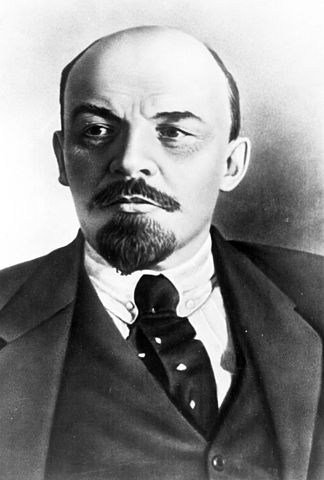A Mushroom Grows in Moscow

Vladimir Lenin, pictured above, is best known as the first Premier of the Soviet Union and a founder of the Bolshevik movement. He died in 1924, but for much of the remainder of the 20th century, his memory was exalted throughout his country. That isn’t to his credit, however; for most of the period of communist rule in the region, publicly criticizing those associated with the ruling party was criminal. So thoughts reflecting poorly upon Lenin and others were rarely voiced, especially not on television, which was state-owned and controlled.
Rarely, but not never. Which is how, in the minds of millions, Vladimir Lenin turned into a mushroom.
On May 17, 1991, Sergey Kurekhin, a musician, was a guest on a Leningrad television show called “The Fifth Wheel.” The show’s host, Sergei Sholohkov, opened the show by saying that they were adding a new section to the program — and Kurekhin as his new co-host. Sholohkov described his new partner as a “famous political activist and actor,” even though Kurekhin wasn’t the former and wasn’t all that famous, either — he had made a name for himself as a jazz/rock musician, but wasn’t someone you’d recognized on the street. The two were in a messy, book-filled room, seated at a table, talking about a “new approach to the well known events from the history of [the Soviet Union] and worldwide.” (You can watch part of the video here, but it’s in Russian with English subtitles.) The first event they tackled was the October Revolution, when Lenin and the Bolsheviks began their ascent in the region. Over muffled laughter, Sholohkov introduced Kurekhin as someone who had just returned from Mexico, and came to an incredible conclusion: Vladimir Lenin was a mushroom.
A professor of anthropology at the University of California, Berkeley, by the name of Alexei Yurchak explained in an academic paper (embedded pdf here). Kurekhin, on his alleged visit to Mexico, “had seen frescos that depicted the Mexican revolution of the early twentieth century in a style identical to the one used for the Russian Bolshevik revolution.” Kurekhin concluded that the similarities were too staggering to write off as a mere coincidence, and ascribed them instead to drug use. The Mexican revolutionaries, he argued, had peyote and hallucination-inducing cacti. Lenin had mushrooms.
Kurekhin, as recounted in Yurchak’s report, continued:
“Reading the correspondence between [Vladimir] Lenin and [Iosif] Stalin I came across one phrase: ‘Yesterday I ate too many mushrooms, but I felt great.’” Bolshevik leaders ate a lot of mushrooms, Kurekhin mused, and some of them surely had hallucinogenic properties. If consumed for many years, these mushrooms can permanently change an individual’s personality. Indeed, Kurekhin continued in an unwavering scholarly tone, “I have absolutely irrefutable proof that the October Revolution was carried out by people who had been consuming certain mushrooms for many years. And these mushrooms, in the process of being consumed by these people, had displaced their personalities. These people were turning into mushrooms. In other words, I simply want to say that Lenin was a mushroom.”
Of course, this is all a prank. Vladimir Lenin didn’t have a psychotropic mushroom habit.
But a lot of people weren’t willing to believe that state-run TV would allow for such a joke. As a result, many believed it, at least to some degree. The television station, per Yurchak, was “overwhelmed with phone calls from viewers,” many of whom were “completely confused about the program.” After all, joking about Lenin wasn’t something commonly done, in public or otherwise — but on television, unthinkable! Except that it actually happened.
The lie spread so widely that the Regional Committee of the Communist Party denied the assertions: the spokesperson said that it had to be false, as “a mammal can not be a plant.” (We’ll excuse the science error — a mammal cannot be a fungus, either.)
Bonus fact: Apparently, there’s a Japanese proverb which says that “abundant lightning means an abundant rice harvest.” That’s likely a myth, at least when it come to rice. But it may be true for mushrooms. According to a 2010 study, as relayed by National Geographic, lightning may make mushroom grow more quickly, effectively doubling the yield.
From the Archives: Boom Goes the Natural Gas Pipeline: The bonus fact talks about another Cold War-era hoax.
Related: A grow-it-yourself mushroom kit. Not the “will make you hallucinate” kind, one hopes.
